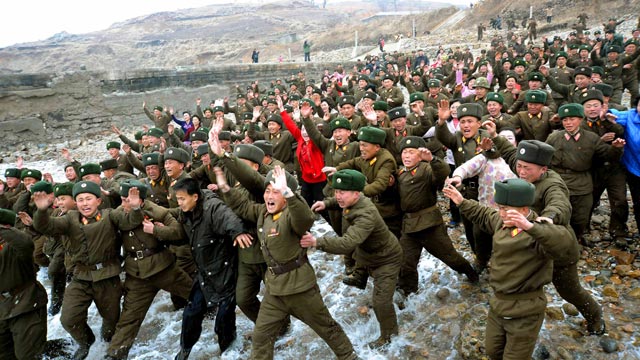
A unilateral move to end the pact was not legally possible, it said.
As well as the armistice threat North Korea has in recent days also cut off a hotline and vowed to end non-aggressions pacts with Seoul.
It says it is responding to US-South Korea military drills and new sanctions imposed after its third nuclear test.
The two Koreas remain technically at war because the 1950-53 conflict ended in an armistice, not a treaty.
North Korea has declared that armistice "invalid", but South Korea said a one-sided declaration was insufficient.
"Unilateral abrogation or termination of the armistice agreement is not allowed under its regulations or according to international law," Foreign Ministry spokesman Cho Tai-Young said.
Seoul would "absolutely keep the armistice agreement as well as strengthen consultation and cooperation with the United States and China, who are also concerned parties of the armistice", he said.
"We demand North Korea withdraw remarks threatening stability and peace on the Korean peninsula and in the region," the spokesman added.
This is not the first time North Korea has said it was withdrawing from the armistice. It also issued a similar threat after its nuclear test in 2009, for example.
'Bellicose rhetoric'
In recent weeks, however, there has been a marked escalation in rhetoric from Pyongyang, following international condemnation of its nuclear test.
It opposes the fresh UN sanctions and has also voiced bitter opposition to two annual joint US-South Korea military exercises that are currently under way.
State-run television showed footage on Monday of mass rallies across the country to denounce the US and South Korea, while the state news agency also described leader Kim Jong-un briefing troops at a military unit near a border island.
He told local commanders on Baengnyeong Island - close to the disputed inter-Korean maritime border and the site of the 2010 sinking of a South Korean warship, the Cheonan - to conduct "merciless firepower strikes" if provoked, KCNA said.
Late last week he gave similar instructions to troops near Yeonpyeong Island, the scene of shelling in November 2011 that left four South Koreans dead, KCNA said.
White House spokesman Jay Carney said the US was "certainly concerned by North Korea's bellicose rhetoric".
"The threats that they have been making follow a pattern designed to raise tension and intimidate others," he said.
On Monday the US imposed additional sanctions on North Korea. The US Treasury added the Foreign Trade Bank (FTB) of North Korea and Paek Se-bong, the chairman of a committee which it said oversaw production of ballistic missiles, to the sanctions list.
The US State Department also added three North Korean officials it said had links to the communist country's proliferation activities.
The sanctions ban any US individual or entity from transactions with those named.
In a speech, US National Security Advisor Tom Donilon said North Korea should "change course" to obtain the aid and respect it sought.
"North Korea's claims may be hyperbolic, but as to the policy of the United States, there should be no doubt: We will draw upon the full range of our capabilities to protect against, and to respond to, the threat posed to us and to our allies by North Korea."
A spokesman for South Korean President Park Geun-hye, meanwhile, has said that her first overseas trip since taking office will be to the US in May, taking into account "the recent Korean Peninsula situation".
North Korea's third nuclear test followed an apparently successful launch in December of a three-stage rocket, seen as a banned test of missile technology.
Regional neighbours and the US fear Pyongyang is working to build a nuclear warhead small enough to put on a missile, but believe it does not yet have the capabilities to do so.-British Broadcasting Corporation (March 12, 2013)

No comments:
Post a Comment